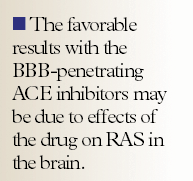- Safety & Recalls
- Regulatory Updates
- Drug Coverage
- COPD
- Cardiovascular
- Obstetrics-Gynecology & Women's Health
- Ophthalmology
- Clinical Pharmacology
- Pediatrics
- Urology
- Pharmacy
- Idiopathic Pulmonary Fibrosis
- Diabetes and Endocrinology
- Allergy, Immunology, and ENT
- Musculoskeletal/Rheumatology
- Respiratory
- Psychiatry and Behavioral Health
- Dermatology
- Oncology
ACE inhibitors that penetrate the blood-brain barrier may slow Alzheimer's progress
Researchers have found that angiotensin-converting enzyme (ACE) inhibitors that penetrate the blood-brain barrier (BBB) appear to reduce the incidence of Alzheimer's disease (AD) in elderly patients with hypertension.
Researchers have found that angiotensin-converting enzyme (ACE) inhibitors that penetrate the blood-brain barrier (BBB) appear to reduce the incidence of Alzheimer's disease (AD) in elderly patients with hypertension. In a randomized, prospective, parallel group trial (N=162), patients given 1 of 2 brain-penetrating inhibitors (perindopril 2 mg/d or captopril 37.5 mg/d) exhibited smaller declines in Mini-Mental State Examination (MMSE) scores compared with patients in 2 other treatment groups.
Evidence exists that certain components of the renin-angiotensin system (RAS) may have a role in learning and memory processes. The ACE gene is over-expressed in the hippocampus, frontal cortex, and caudate nucleus of patients with AD. In animal models, brain-distributing ACE inhibitors were shown to rescue neuronal damage and improve behavior.
The current study tested the hypothesis that treatment with ACE inhibitors that penetrate the BBB would slow the rate of cognitive decline in patients with mild-to-moderate AD and hypertension. Eligible patients were aged 65 or older; had MMSE scores between 13 and 23; showed no evidence of stroke, insulin-dependent diabetes, asthma, or obstructive pulmonary disease; and had a systolic blood pressure >140 mmHg and diastolic blood pressure >90 mmHg. Participants had no other clinical cause for dementia other than AD.

The primary analysis was a comparison of the change in MMSE scores between Group A and Group B or Group C. Mean decline in MMSE scores in Group A (0.6±0.1) was lower compared to Group B (4.6±0.3; P=.0023) and Group C (4.9±0.3; P<.001). The researchers suggested that the favorable results with the BBB-penetrating ACE inhibitors may be due to effects of the drug on RAS in the brain, since no differences were seen among the 3 groups with regard to blood-pressure levels. Another possible mechanism is an increased level of brain substance P (SP) by ACE inhibitors. Increased SP can augment the activity of neprilysin, which may improve the outlook for the progression of AD.
A limitation of the study was that the declining rate of MMSE scores in Groups B and C was more pronounced in this study compared with a previous study. Researchers reevaluated the scores of participants in Groups B and C who showed a rapid decline (more than 6 points per year), and found that they had limited activities of daily living (ADL). However, no significant differences were found in the proportion of frail AD patients with limited ADL. Study results suggest that ACE inhibitors may have clinical benefit even in patients with limited ADL.
In an accompanying commentary, David S. Knopman, MD, observed that the "study's findings are provocative and exciting, but readers must be skeptical." He explained: "It is not clear whether perindopril, captopril, or both drove the effect." Dr Knopman also expressed concern about the lack of adverse events, the high retention rate of patients in both study arms, and the fact that the medications were not administered blindly.
SOURCES Ohrui T, Tomita N, Sato-Nakagawa T, et al. Effects of brain-penetrating ACE inhibitors on Alzheimer disease progression. Neurology. 2004;63: 1324-1325.
Knopman DS. Effects of brain-penetrating ACE inhibitors on Alzheimer disease progression: A handful of ACEs? Neurology. 2004;63:1145.
Coalition promotes important acetaminophen dosing reminders
November 18th 2014It may come as a surprise that each year Americans catch approximately 1 billion colds, and the Centers for Disease Control and Prevention estimates that as many as 20% get the flu. This cold and flu season, 7 in 10 patients will reach for an over-the-counter (OTC) medicine to treat their coughs, stuffy noses, and sniffles. It’s an important time of the year to remind patients to double check their medicine labels so they don’t double up on medicines containing acetaminophen.
Support consumer access to specialty medications through value-based insurance design
June 30th 2014The driving force behind consumer cost-sharing provisions for specialty medications is the acquisition cost and not clinical value. This appears to be true for almost all public and private health plans, says a new report from researchers at the University of Michigan Center for Value-Based Insurance Design (V-BID Center) and the National Pharmaceutical Council (NPC).
Management of antipsychotic medication polypharmacy
June 13th 2013Within our healthcare-driven society, the increase in the identification and diagnosis of mental illnesses has led to a proportional increase in the prescribing of psychotropic medications. The prevalence of mental illnesses and subsequent treatment approaches may employ monotherapy as first-line treatment, but in many cases the use of combination of therapy can occur, leading to polypharmacy.1 Polypharmacy can be defined in several ways but it generally recognized as the use of multiple medications by one patient and the most common definition is the concurrent use of five more medications. The presence of polyharmacy has the potential to contribute to non-compliance, drug-drug interactions, medication errors, adverse events, or poor quality of life.
Medical innovation improves outcomes
June 12th 2013I have been diagnosed with stage 4 cancer of the pancreas, a disease that’s long been considered not just incurable, but almost impossible to treat-a recalcitrant disease that some practitioners feel has given oncology a bad name. I was told my life would be measured in weeks.
